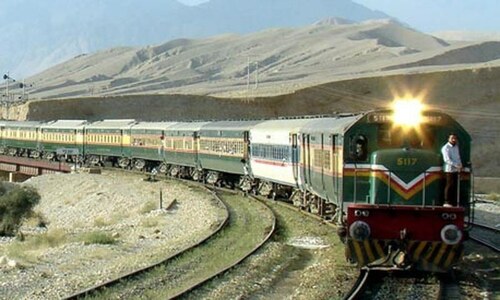ISLAMABAD: The Pakistan Institute of Development Economics (PIDE) — a state-owned think tank working under the Planning Commission — has found that 115,000 unverified retired employees of Pakistan Railways are being paid Rs35 billion in annual pension.
In a statement issued on Sunday, PIDE said its study showed that Railways losses amounted to a prodigious Rs144bn during the five years from 2015 to 2020.
The PIDE report recommended radical institutional reforms in Pakistan Railways, as it currently ranked among the top ten loss-making state-owned enterprises in Pakistan.
The losses included a Rs44bn deficit reported in 2020, including Rs36bn pension liability on Railways for 120,000 employees. To overcome the deficit and pension liability, a Rs45bn subsidy was provided by the government during that year, the report said.
Report says PR incurring losses for 35 years due to stiff competition from road transport, inability to adopt customer-centric business
“The stiff competition from road transport and the inability of PR to adopt a customer-centric business plan because of complex bureaucratic structure has led to an inefficient, underfinanced and overstaffed public agency running in losses for the last three and a half decades,” it said.
“Additionally, there are 115,000 unverified retirees of PR, who are paid Rs35bn annually,” the report said.
To verify these individuals, a biometric verification system for the pensioners has been proposed. The pension deficit has been fielded by the government for Pakistan Railways. A pay and pension commission has been formed, which will have to think about not only railways but other public enterprises as well.
Furthermore, the Pakistan Railways owns 178,000 acres, of which 145,000 are being used for operational purposes and the remaining 33,000 are the “right of way” entitled to the Pakistan Railways.
This land is both underpriced and underpaid as the rents are concerned. Two options can be exercised to put this ancillary land in use.
Around Rs5-10bn can be generated annually by rewriting the concession agreements and getting rid of the encroaches or by transforming railway stations in big cities like Lahore, Karachi and Islamabad into commercial hubs along the lines of Delhi Metro with decent shopping plazas, cafes and restaurants.
Placed in the “retain and restructure” category after the state-owned firms’ triage exercise in March 2021, the 19th-century infrastructure of Pakistan Railways still grapples with the challenges of the 21st century after several repeated rounds of half-hearted reforms.
The report said half of the ticketing was now electronic, but Pakistan Railways still lacked an enterprise resource planning (ERP) system which integrates all the processes. “Even the flow of financial information within the enterprise reports a delay of 60 days,” it said.
It also recommended that customer relationship management (CRM) systems should be created for the customer relationship, including tracking arrangements, call centres, SMS alerts, etc.
It added that the Railways Automated Booking and Travel Assistance (Rabta) had been advertised and automation was expected to address the leakages which had been the major reason behind the decline in the volume of PR freight in 2020-21.
The report also stressed the need to understand how individuals think and decide to make human resources more productive.
This would require going beyond the “rationality” assumption and expanding the set of tools and strategies Pakistan Railways can think of via behavioural economics.
The losses incurred by Railways could be reframed, so they were more obvious to all levels of employees, such as in terms of the declined health and education facilities for workers’ families, it said. Besides, the cost of subsidies provided by the government can be highlighted in terms of the number of children outside school or poverty relief that the government provides.
Published in Dawn, July 18th, 2022













































